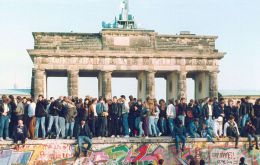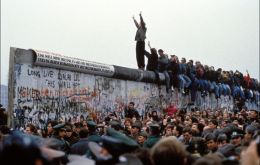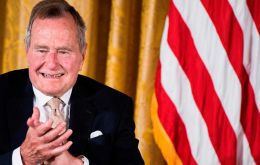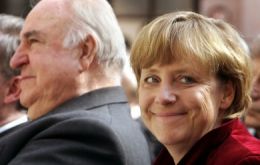MercoPress. South Atlantic News Agency
Tag: Berlin Wall
-
Saturday, May 10th 2025 - 10:21 UTC
Milei describes his planned stage show at the Berlin Wall

During his appearance at the streaming show of die-hard Libertarian Daniel Parisini -known on social networks as Fat Dan (Gordo Dan)- Argentine President Javier Milei suggested staging a “Trial of Capitalism” by the Berlin Wall, with proceeds benefiting the Garrahan Pediatrics Hospital in Buenos Aires.
-
Saturday, August 14th 2021 - 09:34 UTC
Walling off “paradise” for freedom loving Germans: 13 August 1961

Germany is recalling that sixty years ago the communist half of the divided country started to build the Berlin Wall, which would stand as a symbol of oppression and division, until the reunification of the country in late 1989.
-
Monday, November 4th 2019 - 09:31 UTC
Germany will celebrate 30th anniversary of the fall of the Berlin Wall in a “reflective spirit”

Germany marks three decades since the fall of the Berlin Wall this week, but a hint of a return of the Cold War and the rise of nationalism is dampening the mood. Leaders of former Cold War powers will be absent from anniversary festivities, as Donald Trump's America First, Britain's Brexit and Russia's resurgence put a strain on ties.
-
Saturday, December 1st 2018 - 10:34 UTC
George Bush, the graceful victor of Gorbachev and the Soviet empire has died

George Herbert Walker Bush, the World War II veteran who was elected the 41st president of the United States and fathered the nation's 43rd, died late Friday at the age of 94, his family announced in a statement. The Republican spent decades serving in government before ascending to the nation's highest office, having served as United Nations ambassador, CIA chief and vice president under Ronald Reagan, a towering political figure still venerated by the GOP.
-
Wednesday, November 11th 2015 - 05:50 UTC
Germany mourns one of the architects of modern, unified Europe, Helmut Schmidt

Helmut Schmidt, who served as West German Chancellor from 1974 to 1982, has died aged 96, his office says. Mr. Schmidt, who was a Social Democrat, was an architect of the European Monetary System, which linked EU currencies and helped pave the way to the euro. He also helped to consolidate Germany's post-war economic boom.
-
Monday, November 10th 2014 - 09:08 UTC
“Nothing and no one can stand in the way of freedom” says Berlin mayor

More than a million Germans and people from around the world celebrated on Sunday the 25th anniversary of the fall of the Berlin Wall, the event that more than any other marked the end of the Cold War.
-
Thursday, September 20th 2012 - 23:34 UTC
Merkel honours her mentor and Euro architect, Kohl to help discipline the party

Angela Merkel is seeking help from her estranged, former mentor Helmut Kohl, architect of the Euro, to restore voter faith in the European project before next year's election.
